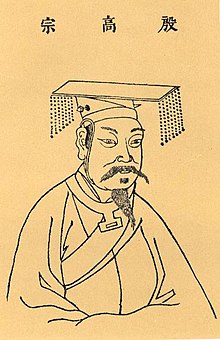| Wu Ding 武丁 | |||||||||
|---|---|---|---|---|---|---|---|---|---|
 Portrait of King Wu Ding of Shang from Sancai Tuhui | |||||||||
| King of Shang (c. 1600 - 1046 BC) | |||||||||
| Reign | c. second half of the 13th century BC | ||||||||
| Predecessor | Xiao Yi | ||||||||
| Successor | Zu Geng | ||||||||
| Chancellors |
| ||||||||
| Born | c. first half of 13th century BC Shang dynasty | ||||||||
| Died | c. 1200 BC Yin | ||||||||
| Spouse | |||||||||
| Issue | Zu Ji | ||||||||
| |||||||||
| Father | Xiao Yi | ||||||||
| Religion | Shang state religion | ||||||||
Wu Ding (Chinese: 武丁; died c. 1200 BC); personal name Zi Zhao (子昭), was a king of the Chinese Shang dynasty who ruled the central Yellow River valley c. 1250 BC – c. 1200 BC. He is the earliest figure in Chinese history mentioned in contemporary records. The annals of the Shang dynasty compiled by later historians were once thought to be little more than legends until oracle script inscriptions on bones dating from his reign were unearthed at the ruins of his capital Yin (near modern Anyang) in 1899.[2] Oracle bone inscriptions from his reign have been radiocarbon dated to 1254–1197 BC ±10 years,[3]: 165 closely according with regnal dates derived by modern scholars from received texts, epigraphic evidence, and astronomical calculations.[3]: 172
Wu Ding's reign is characterized by a prosperous period of the late Shang state, with a wide network of allies and subordinates. The first inscriptions unequivocally recognized as Chinese appeared during his reign, together with new technological innovations. More than a half of Shang inscriptions date to his reign, concerning a wide variety of deities. In classical Chinese historiography, he is often depicted as a meritorious king who appears with worthy officials.
- ^ Boileau (2023), p. 314.
- ^ Bai Shouyi (白壽彝), ed. (2002). An Outline History of China. Beijing: Foreign Language Press. ISBN 7-119-02347-0.
- ^ a b Cite error: The named reference
radiocarbonwas invoked but never defined (see the help page).
Cite error: There are <ref group=lower-alpha> tags or {{efn}} templates on this page, but the references will not show without a {{reflist|group=lower-alpha}} template or {{notelist}} template (see the help page).